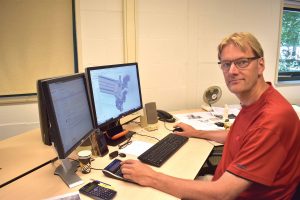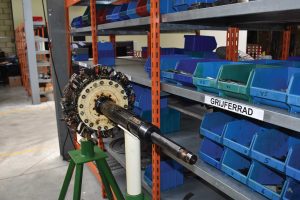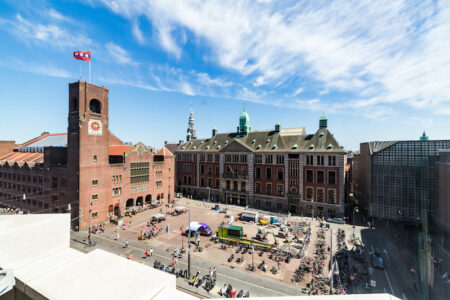Lareka makes its mark on packaging market

Forging the kind of equipment that helps shape trends is a challenging task, but one that Lareka packaging relishes from its base in the Netherlands. Neill Barston tours its facilities near Eindhoven
“It’s all about the speed of innovation – as customers’ demands change, you should be able to respond and be in the front line,” enthuses Henk Somers, managing director of Netherlands-based Lareka.
It’s this forward-thinking approach to packaging equipment development that has served him immensely well over the past couple of decades, witnessing the business grow to meet an expanding range of clients around the world.
As he explains, his own thirst for creativity was instilled at a young age in following his father into working for Philips in Eindhoven.
During its rich history, the pioneering company set the pace with everything from the earliest lightbulbs, through to CDs and medical MRI scanners.
The brief spell which Lareka’s director working for the global electronics giant taught him all the lessons he needed for forging his own pathway.
Though his present company employing 35 people including an engineering and technical team may be a smaller independent operation by comparison, yet it is no less ambitious in its drive to deliver creative new ideas.
This was seen last year when the company received an Additive Manufacturing design challenge award in the Netherlands for its sealing bar system to reduce thermal damage to chocolate as it undergoes production. In addition, the business has made strides in terms of its activities developing bespoke packaging equipment amid a competitive global marketplace.

As the director explains, making the move to switch its entire business model last year towards the confectionery sector away from its traditional roots supplying the tobacco sector under its former guise as Willem II was something of a bold move. However, the company, has reported its ambitious plans have begun to significantly pay off.
So far in 2018, it has reported strong interest in its machinery that has made inroads into producing a new series of equipment for artisan and smaller producers.
Its success is perhaps not unsurprising given its location in Valkenswaard near Eindhoven, as the region, once famed for its medieval falconry, has a considerable pool of tech-savvy engineering talent.
“We’re all proud of where we are from, as Valkenswaard was once the city of the cigars, and our mother company employed over 2,000 people (Willem 2) in this small village. Now we’re the only part of that company that’s still going strong. We have made the switch to the confectionery industry without having any downsizing within our team, and have been able to keep the complete workforce employed.
“There has been a big growth in confectionery, particularly in the chocolate market. For a number of years, we have invested a heck of a lot in research and development, and it’s been fun seeing it grow,” reveals the company director, who says having a renewed sense of focus has proved re-invigorating for the business.
The director and owner adds there continues to be a high level of demand for artisanal and bean-to-bar equipment, and products that are hand crafted for small volumes and personalised gifts.
Industrious attitude
As we tour the company’s facilities, it’s clear the team, including marketing manager Renee Visser, who has spent the past five years with the business, are just as passionate about bringing results for the company as its director.
The design studio is busily beavering away on its present secret project working with a local business, which is keeping them all particularly focused before a much-earned summer break, as with much of the confectionery industry.
According to its director, the apparent rise in consumer demand for ever more inventive individual products that stand out from the crowd have become especially significant. It’s a trend that was noted at this year’s ISM and ProSweets events in Cologne, Germany, where a number of equipment innovations emerged. Among them was Lareka’s latest packaging series.
“We developed a machine, the BTB25, that hasn’t developed before for low volumes, which we hadn’t done before, which is low speed and compact that will allow you to put it in a smaller store, so don’t need to be a technician in order to maintain it. Size conversions can be done by operators, which we were able to showcase at ProSweets, which is able to handle around 25 bars per minutes.
“Since then, we’ve developed a smaller brother for this machine, specialising in smaller chocolates – the movements are not so big and can go faster. That is for low volumes for smaller products, capable of doing 60 bars per minute, the Neapolitan packer 60. We have the experience on the faster machines, which we have translated for crafted chocolate,” adds Somers, who says its systems has so far this year been placed in locations including Dubai, Austria, Switzerland, The Netherlands, and Chile.

As he enthuses, the range of personalisation projects is only limited by a company’s imagination. He cites a business in Switzerland which they have just sold a machine to, which will be used to feature the images of a football team on chocolate pieces, but he says it could equally be developed for anything as varying as restaurant promotions, through to family members faces being portrayed on a limited promotional run.
Sustainability
According to the director, the business has been especially keen on building relations with materials suppliers for crafted products that are focused on delivering on sustainability issues. The company has been able to assist with firms to ensure that their environmentally conscious products are compatible with its equipment.
He says there are an increasing number of retail stores that are reacting to this stores that promote usage of minimal packaging for product ranges.
“We work close to material suppliers to make sure that their materials are suitable for our machines – it’s nice to have sustainable packaging, but if it’s not capable of running on your equipment, then you have a problem.
“But I like the confectionery industry, and the scale of the companies we are working with, many of them smaller companies who are entrepreneurs like us, so that makes conversation easier.
“What I really enjoy seeing with some of our customers like chocolate business Tony’s Chocolonely is their commitment to being socially responsible, when you feel and see that they are doing in a very honest way, not simply to sell products – they want to do something good for society. They really care,” adds Somers of the fellow Netherland’s business in Amsterdam, which bases its model of producing chocolate ranges with a high degree of ethical trading concerns.
In terms of its own approach to sustainability, the company remains among the few that are not only developing new equipment, but also actively overhauling existing packaging lines for confectionery and giving them a whole new lease of life.
This involves working with everyone from smaller artisan producers, through to major global confectionery companies around the world. The company’s director has had more than his fair share of global adventures, recalling particularly interesting missions to the Middle East, as well as in India, where he says the level of efficiency and quality standards continues to rise at an impressive level to compete with European firms.
“Our equipment refurbishment side of the business is going strong – in some respects, innovation in the packaging segment isn’t unfortunately going too fast in innovation, so some machines built in the 1970’s can still do their job the same as those built in 2017,” explains Somers, who says being based in area with such a strong hub of technology businesses means that they can always learn from wider technology techniques surrounding Industry 4.0 to further improve efficiency. It’s a subject which continues to be a consistent theme occupying the minds of development teams across the industry.

As for the director himself, he has plenty to reflect on with the company’s achievements to date. Refreshingly, he seems just as enthusiastic today as he did nearly 25 years ago that he started with the business.
The industry has travelled a long way in terms of technology and trends in that time, but it’s intriguing to note the aspects of the sector he rates has having evolved the most.
“The biggest changes I’ve seen are in terms of hygiene which has increased for certification. It’s certainly one of the most important areas, a focus on safety productivity and more Japanese-like lean production, offering size conversions – in the past few years, the most important on the market side has been sustainability, it’s not a big influence on our machines, but an issue that will be the focus for coming years,” explains the company boss, who says he is never content to stand still in seeking to keep the business competitive.



